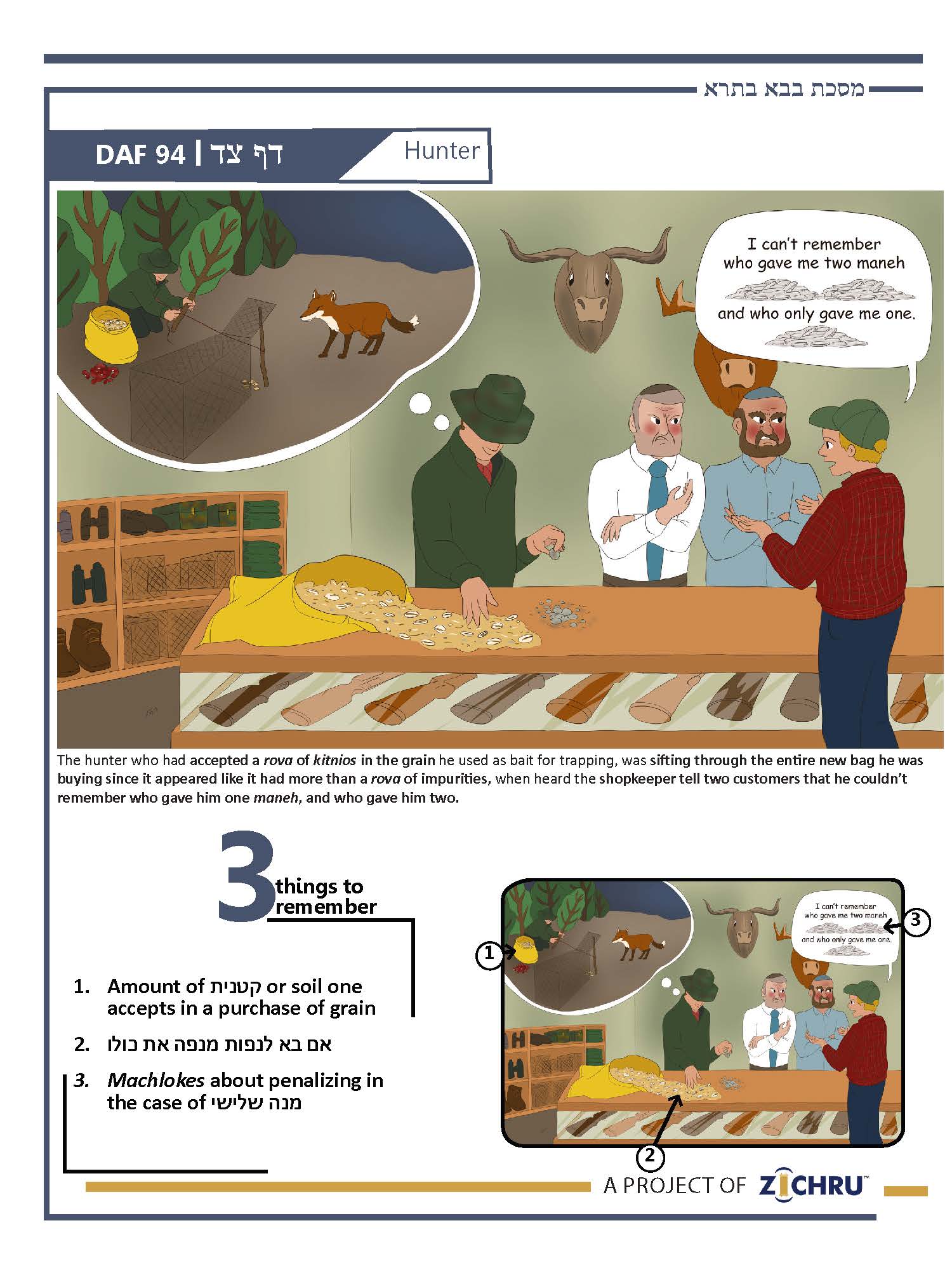Bava Basra - Daf 94
- Audio Timestamps
0:00 - The 3 Sugyos
2:26 - Review of 3 Sugyos
4:46- Siman
5:46 - 4 Blatt Back Chazarah
For access to all Zichru resources including PDFs, and illustrations CLICK HERE
- Amount of קטנית or soil one accepts in a purchase of grain
The Mishnah on the previous Daf stated regarding a purchase of grain: הרי זה מקבל עליו רובע טנופת לסאה – [the buyer] accepts on himself a quarter-[kav] of impurities per se’ah purchased. Rav Ketina taught a Baraisa that the Mishnah refers to a רובע of קטנית – legumes which were mixed into the grain. The Gemara objects that one must also accept עפרורית – soil in purchased grain, because Rabbah said that if one removes a pebble from his friend’s granary, he must pay the value of wheat equal to the pebble’s volume. Since the owner could have sold the grain together with the pebble, removing it requires the owner to add wheat to when selling this grain. This proves one does accept soil in a grain purchase!? The Gemara answers that although one accepts a full רובע of קטנית, he accepts only less than a רובע of soil, not a רובע. The Gemara asks from a Baraisa teaching that a buyer of עדשים – lentils accepts a רובע of soil, and answers that lentils contain more soil, דמיעקר עקרי להו – because they are uprooted.
- אם בא לנפות מנפה את כולו
Rav Huna says: אם בא לנפות – if [the buyer] comes to sift the purchased grain, because it appears to have more than a רובע of impurities, מנפה את כולו – he may sift all of it, and the seller must compensate for all the impurities, including the רובע. Some say this ruling is דינא – the law, because one who pays for grain, אפירי שפירי יהיב – pays for good quality grain, with no impurities. Still, he ordinarily accepts impurities, because he does not bother sifting a se’ah to remove only a רובע. If there is more than a רובע of impurities, a person would bother to sift it, וכיון דטרח טרח בכוליה – and once he bothers to sift it, he sifts all of it. Therefore, when there is more than a רובע, the buyer does not accept any impurities.
Some say this ruling is קנסא – a penalty. Although a רובע of impurities in a סאה of grain is common, more than a רובע is uncommon, ואיהו הוא דעריב – so we suspect [the seller] intentionally mixed in the extra impurities, וכיון דעריב קנסוהו רבנן בכוליה – and since he mixed in the extra, the Rabbis penalized him to compensate for all the impurities.
- Machlokes about penalizing in the case of מנה שלישי
Rav Huna was challenged from a Mishnah where two people deposited money with someone, one leaving one maneh, and the other leaving two maneh, and they later dispute who left two maneh. The Tanna Kamma says each receives a maneh, והשאר יהא מונח עד שיבא אליהו - and the [third maneh] is withheld until Eliyahu comes. This proves that although one is attempting to steal the third maneh, he is not penalized to lose his first maneh!? The Gemara answers that in that case, each one definitely owns a maneh, which we do not penalize, whereas here, מי יימר דלאו כוליה ערובי עריב – who is to say he did not mix in all the impurities? Therefore, he is penalized to replace all the impurities. The Gemara seeks to support Rav Huna from Rebbe Yose’s opinion in that Mishnah, who argues that if each receives a maneh, what does the deceiver stand to lose with his false claim? Instead, all the money is withheld until Eliyahu comes. This proves we do penalize even the amount he is entitled to. The Gemara rejects the proof, because there, ודאי איכא רמאי – there is definitely a deceiver trying to steal, so he is penalized, whereas here, perhaps he did not mix in any impurities, but an abnormally high amount was incidentally present.
Siman – Hunter
The hunter who had accepted a rova of kitnios in the grain he used as bait for trapping, was sifting through the entire new bag he was buying since it appeared like it had more of a rova of impurities, when heard the shopkeeper tell two customers that he couldn’t remember who gave him one maneh, and who gave him two.


